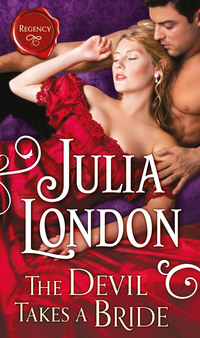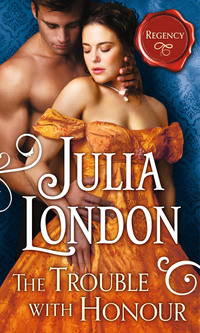
Полная версия
Tempting The Laird
Catriona and her family gasped, but her father, Arran Mackenzie, laughed. “I beg your pardon? Kishorn Abbey sits on land that has been owned by the Mackenzies for more than two hundred years. There was no aiding and abetting. We’ve been loyal subjects, sir, that we have.”
“Kishorn Abbey was used to house fleeing rebels after the loss at Culloden and was operated by a known Jacobite sympathizer in the form of Miss Griselda Mackenzie. It is pointless to deny it, my lord—we have the witness of two of the sympathizers. As the property was used to house traitors, it is forfeited to the Crown by order of the king.”
“By order of the king?” Cailean echoed incredulously. “Are you mad, then? Ten years have passed since the rebellion.”
Mr. Whitson shrugged. “It was a crime then and is yet, sir.”
“What does the Crown care for that old abbey?” Rabbie scoffed. “It’s falling down and too remote to be of any use.”
“There is interest in it,” Mr. Whitson sniffed, and paused to straighten his lace cuffs. “There are those who believe any use would be better than housing women of ill repute.”
Catriona gasped with outrage. “How dare you! Have you no compassion?”
Whitson swiveled about so quickly that she was caught off guard. “There are many in these very hills who do not appreciate the likes you seek to house, Miss Mackenzie. Some are very much against it.”
“It is no one’s affair what we do with our property,” Catriona argued. She was acutely aware of Rhona’s nervous fluttering behind her, and even more acutely aware of the anger that was seeping into her bones and warming her face.
“I will ignore your discourtesy, Whitson, that I will, for you are no’ from these parts, aye?” her father said. “But if you ever deign to speak to my nighean in that manner again, you’ll find yourself at the receiving end of Highland justice, that you will.”
Whitson arched a thick brow. “Do you threaten an agent of the king, my lord?”
“I threaten any man who dares speak to my family in that manner,” her father snapped. “Have you an official decree, then, or are we to take the word of a Sassenach?”
Whitson’s eyes narrowed. “I rather thought you were a man of reason, Mackenzie. You’ve a fine reputation as it stands, but it’s best for all concerned if you do not push too hard, if you take my meaning. An official decree was delivered to Miss Griselda Mackenzie. I’ve not a copy of the decree on my person, but I can have one drawn up, if that is what you prefer.”
“Griselda Mackenzie has departed this life,” her father said to Whitson. “Until I’ve seen official notice of it, I’ve no reason to believe you.”
Mr. Whitson clasped his hands behind his back. “I shall have it delivered posthaste. In the interest of expediency, allow me to inform you the decree grants you and your people six months to vacate the premises of the abbey, and if, by that time, you’ve not vacated, it will be taken by force. The property is forfeited, my lord. The king’s orders are quite clear.”
Catriona’s head began to swim; she thought she might be sick. There were twenty-three souls at the abbey, all but one of them women and children who had been cast out of society. Where would they all go?
“Aye, and you’ve a quarter of an hour to vacate these premises, sir, or be removed by force, as well,” her father said, and with that, he turned his back on the strangers.
“Expect your decree to be delivered by week’s end,” Mr. Whitson said icily. He turned about and started for the door.
“Have you no conscience?” Catriona blurted as he walked past her.
He paused. He slowly turned his head and set his gaze on hers, and Catriona felt a shiver run through her. “My advice to you, madam, is that you keep to the charitable works of proper women.”
“Get out,” Rabbie said in a voice dangerously low.
Whitson walked out of the room, his assistant hurrying after him with his soggy cloak.
All of them remained silent for several moments after the intruders had gone. Catriona’s head was spinning. She thought of the women of the abbey: there was Molly Malone, who had been beaten so badly by her husband that she’d lost the child she was carrying. She’d slipped away in the dead of night with her two young children and a single crown in her pocket. And Anne Kincaid, who, as a lass, had been cast out by a father who had no regard for her. She’d been forced into prostitution to survive. And Rhona, dear Rhona, such a godsend to Kishorn! When her husband had died, there had been no one to take her in. She had done piecework for a year but couldn’t pay her rents. Her landlord had offered her a bargain—her body for a roof over her head. Rhona had endured it for three months before refusing him. He’d forced her onto the streets without a second thought.
There were more of them, many of them with children, and Catriona could not bear to think of what would become of them. She sank onto a chair, her gut churning with disbelief, her heart racing with fear and her head beginning to pound.
“Well, then,” Catriona’s mother said.
“Airson gràdh Dhè, what are we to do with this news?” Aulay asked.
“What can we do that has no’ been tried before?” her father returned as he carefully resumed his seat. “The MacDonalds fought to have property seized by the Crown returned to their heirs and were no’ successful.”
“Aye, but the land they wanted returned was arable land,” Cailean reminded him. “It was more valuable than this,” he added, gesturing vaguely toward the window.
“Aye, ’tis no’ worth a farthing for planting,” the laird agreed. “But this is a valuable glen for a Sassenach who means to run sheep.”
“Can they no’ put their sheep in the glen and leave the abbey?” Catriona asked.
Vivienne snorted. “They donna want the abbey or the women who live here.” She paused and glanced sheepishly at Rhona. “My apologies, Rhona.”
“’Tis no’ necessary,” Rhona said. “We know verra well who we are.”
“I’ve a suggestion,” Catriona’s mother said. “I think Catriona ought to deliver Zelda’s letter to my brother sooner rather than later.”
Her father looked at his wife curiously. “A letter? What letter?”
“Zelda wrote a letter to my brother that has not yet been delivered. You know Knox nearly as well as I, Arran. If there is anyone who might help us, it’s him. He knows everyone in places high and low, and it so happens he is summering in Scotland.”
All of Catriona’s brothers groaned.
The Earl of Norwood’s summering had been a sore spot for them all. He was one of the wealthy Englishmen who had benefited from the forfeitures and seizures of Scots’ land after the rebellion. He’d bought a small estate near Crieff from the Crown and had once crowed he’d purchased the property for as much as a horse.
“Zelda’s letter has naugh’ to do with this,” Catriona said as she looked around for her wineglass.
“Nevertheless, you promised Zelda to see it personally delivered, didn’t you, darling? That’s why you must go to him, and while you are there, you can appeal to him for his help with the abbey.”
“Go to him!” Catriona said, and having located her wineglass, she swiped it up. It was empty again? “I canna leave the abbey now, Mamma. Diah, we’ve only just lost Zelda!”
“They have Rhona,” her mother said, and took the empty wineglass from Catriona’s hand. “Rhona is quite capable of seeing after them.”
Catriona shook her head. “’Tis no’ the same—”
“Aye, Mamma is right,” Vivienne chimed in. “Auntie Zelda would have gone to Uncle Knox straightaway, if that’s what it took, Cat. You’re the abbey’s only hope, you are, and Uncle Knox is your only hope. And besides...” She paused and exchanged a look with her mother. “You could do with a bit of distance, could you no’?”
“Distance?” Catriona repeated, confused, as she tried to retrieve her wineglass from her mother. “From what, pray?”
“From Balhaire. From Kishorn,” her father said.
“Pardon?” The churning in her gut was taking on a new urgency. Something wasn’t right, but she was having a wee bit of trouble thinking clearly.
“You were a blessing to my cousin, God knows you were,” he said. “But you’ve tended her deathbed for months, and now it is time you saw to your own life.”
Catriona blinked. Her thoughts were suddenly very clear—they’d been discussing her. Her own family, talking in secret about her! She could see it in the faces of her parents, of her siblings, of her sisters-in-law. They surrounded her now, looking at her with varying expressions of determination and sympathy. “What’s this, then, you’ve discussed my life and determined a course, have you? How dare you speak ill of me behind my back.”
“Criosd, Cat, no one has spoken ill of you!” Rabbie said. “But for the last few months, you mope about and drink your fill of wine and brandy every night, aye?” Rabbie said. “You donna attempt to have any society about you.”
“What society?” she exclaimed loudly. “Where is it, Rabbie, do point me in that direction, aye? And in the course of it, perhaps you might point to something that I might do.”
He frowned. “Do you no’ see what we all see? You’re letting your life slip between your fingers, you are.”
She felt strangely exposed. Uncomfortable. Not angry, really, but...but she didn’t like this, not at all. What did they expect of her? None of them had ever been a spinster, with nothing to look forward to, without any hope of ever being a mother, or a wife. “What would you have me do? I’ve no occupation, no’ a bloody thing to do with my time but mope about and drink wine and brandy!” She felt on the verge of tears. She felt annoyed, she felt betrayed, she felt as if they’d all left her behind. Every one of them had families and loves and occupations, and purpose, for God’s sake, but she, by virtue of being born female and at a time when suitable men were scarce, could do nothing but float from one gathering to the next, looking for something to do with her time.
The only meaningful thing in her life at present was the abbey. Zelda had given a purpose to Catriona’s life, and they would take it away?
Blast it, but the tears began to slip from her eyes again.
“Diah, I didna say it to make you cry,” Rabbie said gruffly.
Her mother walked to Catriona’s seat and wrapped her arms around her daughter. “Go to your uncle Knox, allow him to help you, and please, darling, take a bit of time to care for yourself.”
“I canna leave them,” she said tearfully, and took the handkerchief Daisy offered her and blew her nose.
“Aye, Miss Catriona, you can.”
Catriona stilled. The mutiny was complete, then. “You, too, Rhona?” she asked in a whimper.
Rhona colored slightly. “We’ll be quite all right for the summer, aye?” she said nervously. “Your lady mother, she...well, she’s right, she is. You deserve happiness, Miss Catriona. You’ve no’ had it at Kishorn.”
Catriona wanted to argue that she was happy, but it was a lie. She was desperately unhappy with her situation, and apparently, in spite of her best efforts to hide it, they all knew it.
“Rhona and I had opportunity to speak,” her mother said. “We agree everyone might look after themselves. But I very much miss my bright daughter.”
Her “bright daughter” had withered away a very long time ago, and in her place, a lonely Catriona stood.
“I’ll help at the abbey while you’re away,” Lottie said.
“So will I,” Bernadette offered.
“Me, too!” Daisy joined in. “All of us.”
“Aye, well, you’ll no’ know what to do, any of you,” Catriona said petulantly. “You’ll make a mess of things.”
“We verra well might,” Aulay agreed, and leaned down to kiss the top of Catriona’s head. “But you’ll put it all to rights when you return, aye?”
Catriona rolled her eyes. “I’ve no’ said I’ll go,” she warned them.
But by the end of the week, Catriona was on a Balhaire coach bound for Crieff and Uncle Knox.
CHAPTER TWO
THE JOURNEY FROM Balhaire to Crieff was tiresome, particularly given that the roads were single track and many of them used so infrequently that the coachmen were forced to stop more than once to clear debris from their path. Every day for a week they bounced along to a mean inn, then woke up and started the day over again.
Contrary to her family’s wishes, Catriona’s bleak mood was not improved by the travel.
It seemed weeks had passed instead of days when at last the coach rolled onto the High Street at Crieff and came to a halt at the Red Sword and Shield Inn. It was midday, but Catriona was so weary she all but fell out of the coach and into the hands of the young Mackenzie coachman who caught her and set her upright.
“Here you are, then, Miss Mackenzie,” he said. “We’ll be back for you in a fortnight, perhaps three weeks, aye?”
In that moment, she didn’t care if they ever returned for her, because she could not fathom putting herself in that coach once more.
“There she is!” called a voice very familiar to her.
She turned about and smiled at her uncle Knox, who strode across the cobblestones to her, his coat flapping in time to his gusto. “My dear, dear girl, you’ve come at last!”
Her beloved uncle met her with such verve and enthusiasm that she was propelled a step or two backward, and her cap was knocked from her head. He wrapped her in a hearty embrace, smashing her face against his chest, then laid several kisses on her cheek before standing back, holding her at arm’s length, admiring her as the coachmen tried to hand her the hat. “Still a beauty, my little one,” he said proudly.
Still? She supposed that now she was three and thirty, he was expecting her looks to have begun to fade away into spinsterhood. “It’s so good to see you, Uncle Knox,” she said. “You’ve no idea.”
Her uncle had grown a wee bit more corpulent since the last time she’d held him. What was it, a year or so ago? He’d come from England to visit his sister, Catriona’s mother—and to pay a call to Auntie Zelda at Kishorn. Aye, he was a wee bit rounder, but quite handsome with his glittering pale green eyes and graying hair, which he’d bobbed with a black velvet ribbon. His coat was fine wool, and his waistcoat had been embroidered with gold thread that matched the embroidery along the center front of his coat. His neckcloth was snowy white and tied into an elaborate knot. Catriona felt quite plain in comparison.
“Come, come, you must be thirsty. And hungry, too, are you? Here you are, my good men, a night’s lodging and all the wine and women you might want,” he said, tossing a bag of coins to the driver. “Don’t hasten back now. I should like time with my most favored niece.” He wrapped an arm around Catriona’s shoulders and wheeled her about. “It’s such a dreadfully long way from Balhaire, is it not? I’ve always said to Margot that there ought to be an easier way to reach her, but alas, she has long loved your father and refuses to leave him.”
“Leave him?” Catriona exclaimed.
“You’ve come alone, have you? No girl to tend you? Nothing but those brutes to drive you and handle your trunk?” he asked as he hurried her along the cobblestones toward the entrance of the inn’s public room. Bright red poppies graced the window boxes, and tables and chairs had been arranged outside, yet there was no one enjoying the sun.
“I’ve a girl for you if you haven’t one, although I can’t vouch for her skills. She seems to do well enough to my eyes, but my guest, Miss Chasity Wilke-Smythe, claims she is wretched, and yet Chasity looks rather pretty to these old eyes.”
Guests! Catriona should have known—Uncle Knox constantly surrounded himself with a retinue of friends and acquaintances, gathered from far-flung corners and questionable establishments. Catriona felt suddenly self-conscious as he bustled her along. She could smell herself, felt wretched in her traveling clothes and wanted nothing more than a hot bath and a wee bit of brandy.
“Between you and me, love, the Wilke-Smythes are a bit demanding,” Uncle Knox said in a low voice. “And a bit too far on the side of the Whigs, if you take my meaning.” He waggled his brows at her.
She did not take his meaning.
“But you will find great company in them, I am certain of it, and if not, there is Countess Orlov and her cousin, Vasily Orlov. Now, there is a colorful pair if ever there was.” He leaned his head to hers and whispered, very dramatically, “Russians.”
“I beg your pardon, Uncle. You didna mention you were already entertaining guests in your reply to my request to join you.”
“Why, I’ve hardly any!” he declared. “And besides, I should have an entire assembly under my roof and turn them all away if it meant I might spend a summer with my much beloved niece.”
“No’ a summer, Uncle. A fortnight—”
“Here we are!” he declared, ignoring her, and with one arm around her, he used the other as a sort of battering ram and shoved open the door of the inn, then loudly proclaimed, “She’s here!”
The small group of people gathered at a table in the center of the room looked at her. Those were her uncle’s guests, she gathered, as the only other people in the inn were two men standing at the counter in the back with tankards before them.
Uncle Knox dragged Catriona forward to the table and introduced her to his company: Mr. and Mrs. Wilke-Smythe and their daughter, Miss Chasity Wilke-Smythe. Miss Chasity Wilke-Smythe resembled her mother so much that the pair looked a wee bit like twins in their powdered hair and matching coats. The former, at first glance, seemed scarcely old enough to be out.
She then met Countess Orlov, an elegant woman with a discerning gaze, and her cousin, the handsome, yet foppish, Mr. Vasily Orlov. “You must call me Vasily,” he said, his name rolling off his tongue as he bowed over her hand.
Next was Mrs. Marianne Templeton, whom Catriona knew as the widowed sister of Uncle Knox’s neighbor in England. Her mother had mentioned her once, had said she was quite eager to make Uncle Knox her next husband. She looked a wee bit older than Uncle Knox and examined Catriona from the top of her head to the tips of her boots. And last, an elderly gentleman with thick, wiry brows. Lord Furness, an old friend, her uncle said, scarcely glanced at her.
Uncle Knox sat her between Lord Furness and Miss Chasity Wilke-Smythe and ordered tots of whisky for them all. “In honor of my niece. The Scots are fond of whisky, is that not so, Cat?”
“Ah...many are, aye,” she agreed.
“When in Scotland, lads, we drink as the Scotch do,” Uncle Knox said, and held his tot aloft. “To Scotland!”
“To Scotland!” his guests echoed.
Catriona tolerated whisky well enough, but she was so parched today that she downed the tot and set the small glass firmly on the table. That was when she noticed everyone was staring at her. “It was just a wee tot,” she said a bit defensively. She was still bruised from the apparent censure she’d received from her family on that rain-soaked afternoon at Kishorn.
“Another!” shouted Uncle Knox. “Another round for us all!”
The whisky had the effect of making the group a bit merrier. They began to laugh and talk over one another, correcting each other’s accounting of what had happened the night before, which, from the sound of it, had been a game of Whist gone horribly wrong. Catriona listened, and she smiled and nodded where she thought she ought, but she felt nothing but fatigue weighing her down. She leaned far back in her chair so that Lord Furness could speak over her to Miss Wilke-Smythe. The inn was beginning to fill, and she prayed that meant Uncle Knox would soon see them to Dungotty, the estate he’d allegedly purchased for a song. Unfortunately, he showed no sign of leaving, ordering kidney pies for all, and moving them from whisky to ale when Mrs. Templeton began to laugh a little too loudly.
Another hour passed. Catriona felt herself sliding down her wooden seat and glanced at the watch pinned to her gown to gauge the time. When she wearily lifted her gaze, her eyes landed on the back of a man. He was quite tall. He was wearing a cloak that, from even a bit of distance, she could see was made of the finest wool. His snowy-white collar covered the back of his neck, and his hair, as black as his cloak, was bobbed into a queue with a single green ribbon. She had not seen him come in. He had taken a seat near the window, quite alone, and sat with one leg crossed over the other, one arm slung across the back of an empty chair, and gazed through the windowpanes at the goings-on in the street.
Catriona was suddenly nudged with an elbow. “I can’t believe he’s come in,” whispered Miss Wilke-Smythe.
“Pardon?”
The young woman nodded in the direction of the tall man with the green ribbon. “That is the Duke of Montrose,” she whispered excitedly. “Look, there’s the coach from Blackthorn,” she said, nodding toward the window.
Catriona looked at the man’s back again.
“You’ve no doubt heard of him, haven’t you?” asked Miss Wilke-Smythe.
Catriona shook her head. “Should I have?”
“Yes!” Miss Wilke-Smythe said in a near squeal. She clamped her hand down on Catriona’s arm and squeezed with alarming strength. “He’s quite notorious,” she said, her brown eyes glittering.
He didn’t seem so notorious to Catriona. “Why is that, then?”
Miss Wilke-Smythe leaned even closer, so that Catriona could feel her breath on her neck, and whispered, “They say he murdered his wife.”
“What?” Catriona blinked. She turned her head to look at the young woman. “You jest,” she accused her.
“Not in the least! Everyone says so—they say she simply disappeared. One night, she hosted a table set with so much china and silver that armed guards stood before the mansion. And the next day, she vanished, just like that,” she said with a snap of her gloved fingers. “One moment she was here, and the next, vanished. No one has seen her since.”
Catriona looked at the broad back of the man at the window. “That’s impossible.”
“You must hear it from Lord Norwood!” Miss Wilke-Smythe said, referring to Uncle Knox, who happened to be the Earl of Norwood. “He relayed it all to me.”
“All right, then, that’s enough of this,” her uncle suddenly said, and stood up, swaying a bit on his feet. “Time I see my darling niece home, I should think. Where are her trunks? Has someone got her trunks?”
“Well, I haven’t got them,” Lord Furness said, and staggered to his feet, too. In fact, there was a lot of rattling about as they all stood, casting around for discarded cloaks and reticules, hats and bonnets. In the flurry, Catriona tried to get a look at the duke’s face, but his back was very much to the door, and Vasily Orlov chose that moment to sidle up to her with a leering sort of smile. “Norwood was remiss in mentioning the beauty of his niece,” he purred.
Catriona stepped away from him and followed her uncle as he and his party stumbled into bright sunlight.
The Balhaire coach was gone, and in its place, a large barouche coach waited. It sported red plumes at every corner, and the gold seal of Montrose was emblazoned on its doors, much like the sort of coach Catriona had seen at Norwood Park when she was a child.
“By devil, has Montrose shown his face in town?” Uncle Knox said as he linked Catriona’s arm through his.
“He has indeed,” Lord Furness said as they stood together, admiring the coach. “Did you not see the gentleman in the inn? It can be no one but him, not with the garish signet ring he wore.”
“What? In the inn? I did not,” Uncle Knox said. “Jolly well brave of him to come round, I’d say. Come along, Cat darling, you are with me. I’ve a new buggy, a cabriolet. From France,” he said, as if that pleased him.
“What of my trunks?” she asked, looking back over her shoulder for them.









